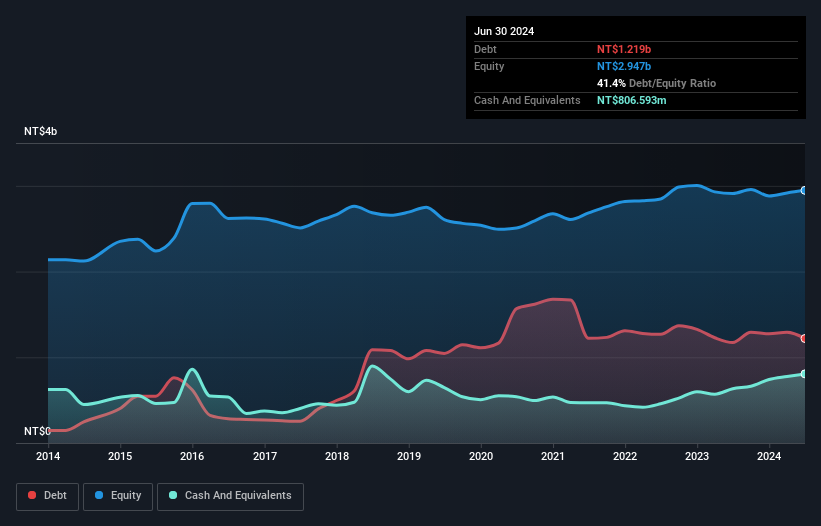Would TAIWAN CHELIC (TWSE:4555) Be Better Off With Less Debt?
The external fund manager backed by Berkshire Hathaway's Charlie Munger, Li Lu, makes no bones about it when he says 'The biggest investment risk is not the volatility of prices, but whether you will suffer a permanent loss of capital.' It's only natural to consider a company's balance sheet when you examine how risky it is, since debt is often involved when a business collapses. We can see that TAIWAN CHELIC Co., Ltd. (TWSE:4555) does use debt in its business. But is this debt a concern to shareholders?
When Is Debt Dangerous?
Generally speaking, debt only becomes a real problem when a company can't easily pay it off, either by raising capital or with its own cash flow. Part and parcel of capitalism is the process of 'creative destruction' where failed businesses are mercilessly liquidated by their bankers. However, a more common (but still painful) scenario is that it has to raise new equity capital at a low price, thus permanently diluting shareholders. Having said that, the most common situation is where a company manages its debt reasonably well - and to its own advantage. When we think about a company's use of debt, we first look at cash and debt together.
Check out our latest analysis for TAIWAN CHELIC
What Is TAIWAN CHELIC's Debt?
The image below, which you can click on for greater detail, shows that at June 2024 TAIWAN CHELIC had debt of NT$1.22b, up from NT$1.17b in one year. On the flip side, it has NT$806.6m in cash leading to net debt of about NT$412.4m.

How Strong Is TAIWAN CHELIC's Balance Sheet?
According to the last reported balance sheet, TAIWAN CHELIC had liabilities of NT$623.4m due within 12 months, and liabilities of NT$920.4m due beyond 12 months. Offsetting these obligations, it had cash of NT$806.6m as well as receivables valued at NT$446.1m due within 12 months. So it has liabilities totalling NT$291.2m more than its cash and near-term receivables, combined.
Of course, TAIWAN CHELIC has a market capitalization of NT$3.13b, so these liabilities are probably manageable. Having said that, it's clear that we should continue to monitor its balance sheet, lest it change for the worse. When analysing debt levels, the balance sheet is the obvious place to start. But ultimately the future profitability of the business will decide if TAIWAN CHELIC can strengthen its balance sheet over time. So if you want to see what the professionals think, you might find this free report on analyst profit forecasts to be interesting.
In the last year TAIWAN CHELIC had a loss before interest and tax, and actually shrunk its revenue by 14%, to NT$1.4b. That's not what we would hope to see.
Caveat Emptor
While TAIWAN CHELIC's falling revenue is about as heartwarming as a wet blanket, arguably its earnings before interest and tax (EBIT) loss is even less appealing. Indeed, it lost NT$44m at the EBIT level. When we look at that and recall the liabilities on its balance sheet, relative to cash, it seems unwise to us for the company to have any debt. Quite frankly we think the balance sheet is far from match-fit, although it could be improved with time. For example, we would not want to see a repeat of last year's loss of NT$43m. So in short it's a really risky stock. The balance sheet is clearly the area to focus on when you are analysing debt. But ultimately, every company can contain risks that exist outside of the balance sheet. We've identified 2 warning signs with TAIWAN CHELIC (at least 1 which is potentially serious) , and understanding them should be part of your investment process.
If, after all that, you're more interested in a fast growing company with a rock-solid balance sheet, then check out our list of net cash growth stocks without delay.
Have feedback on this article? Concerned about the content? Get in touch with us directly. Alternatively, email editorial-team (at) simplywallst.com.
This article by Simply Wall St is general in nature. We provide commentary based on historical data and analyst forecasts only using an unbiased methodology and our articles are not intended to be financial advice. It does not constitute a recommendation to buy or sell any stock, and does not take account of your objectives, or your financial situation. We aim to bring you long-term focused analysis driven by fundamental data. Note that our analysis may not factor in the latest price-sensitive company announcements or qualitative material. Simply Wall St has no position in any stocks mentioned.
 Index Options
Index Options CME Group
CME Group Nasdaq
Nasdaq Cboe
Cboe TradingView
TradingView Wall Street Journal
Wall Street Journal